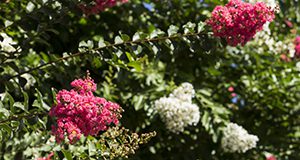Abstract
This series of Key Plant, Key Pests publications are designed for Florida gardeners, horticulturalists and landscape professionals to help identify common pests associated with common Florida flora. This publication, the first in the Key Plant, Key Pests Series, helps identify the most common pests found on the Crapemyrtle (Lagerstroemia). Crapemyrtle are known for being one of the most pest-free landscape plants. This publication provides information and general management recommendations for the crapemyrtle aphid, metallic beetles and powdery mildew.
https://edis.ifas.ufl.edu/ep560
References
Burkness, S. and J. Hahn. 2007. Flea beetles in home gardens. Extension publication no. M1210. St. Paul: University of Minnesota Extension.
Herbert, J. and and R. F. Mizell, III. 2015.Crapemyrtle aphid, Tinocallis kahawaluokalani (Kirkaldy). EENY-365. Gainesville: University of Florida Institute of Food and Agricultural Sciences. http://edis.ifas.ufl.edu/in663
Knox, G. W. 2016. Crapemyrtle in Florida. ENH-52. Gainesville: University of Florida Institute of Food and Agricultural Sciences. http://edis.ifas.ufl.edu/mg266
United States National Arboretum. 2004. "Crapemyrtle FAQ 2." Last modified on October 14. http://www.usna.usda.gov/Gardens/faqs/crapemyrtlefaq2.html
Zhang, S., Palmateer, A. and Pernezny, K. 2017. Florida Plant Disease Management Guide: Beans. PDMG-V3-33. Gainesville: University of Florida Institute of Food and Agricultural Sciences. http://edis.ifas.ufl.edu/pg041
Early Detection and Distribution Mapping System. 2017. "What is the Crapemyrtle Bark Scale?" Last modified December 14. http://www.eddmaps.org/cmbs/
Unless otherwise specified, articles published in the EDIS journal after January 1, 2024 are licensed under a Creative Commons Attribution-NonCommercial-NoDerivs 4.0 International (CC BY-NC-ND 4.0) license.

